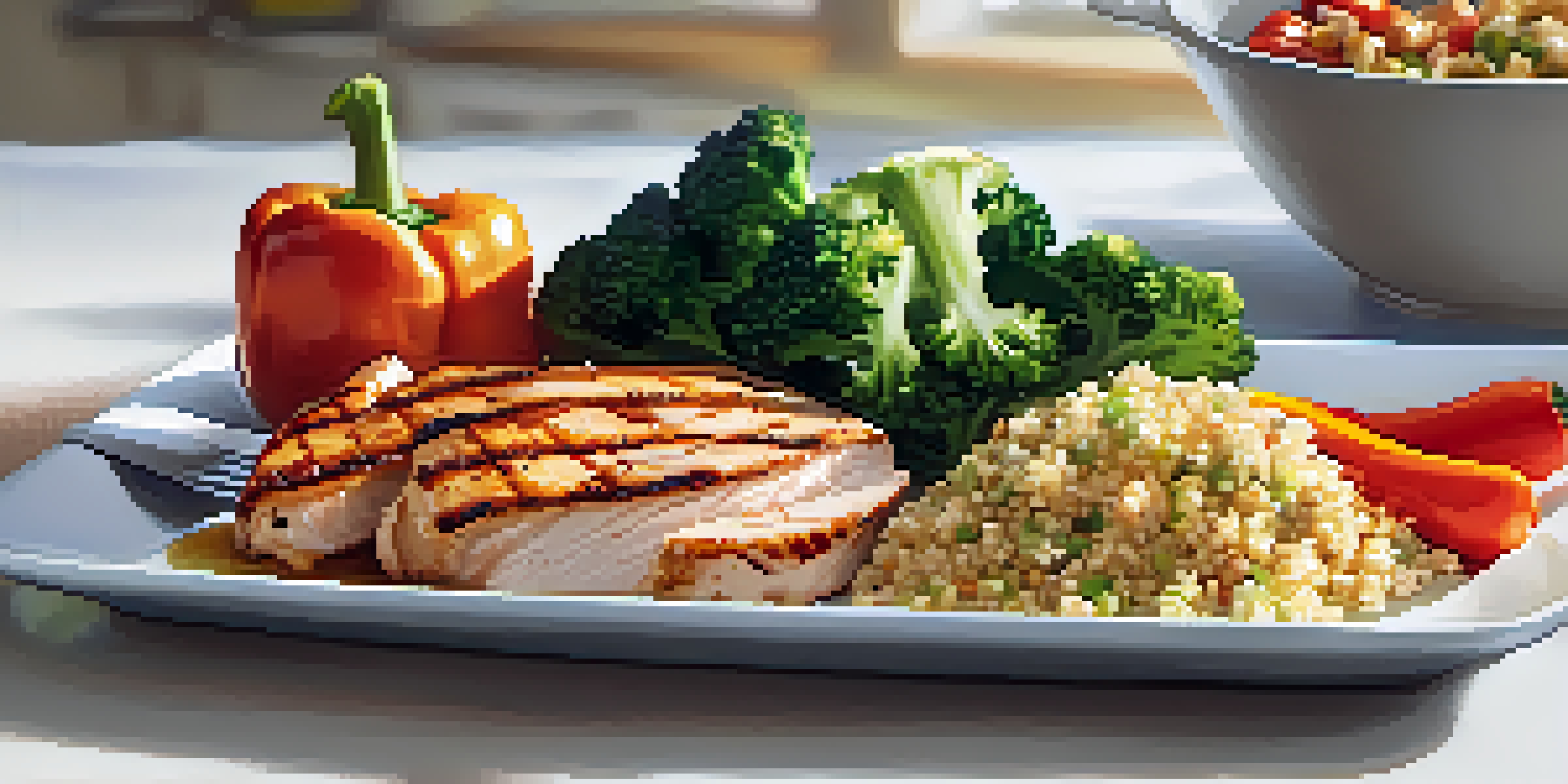Culinary Medicine: Enhancing Recovery Post-Surgery with Food

Understanding Culinary Medicine and Its Importance
Culinary medicine is an innovative approach that combines the art of cooking with medical nutrition science. This intersection focuses on how food affects our health, especially in recovery situations like post-surgery. By understanding the nutritional needs during healing, culinary medicine empowers patients to make informed dietary choices that facilitate recovery.
Let food be thy medicine and medicine be thy food.
Imagine food as a toolkit for your body; just as a mechanic uses tools to repair an engine, we can use specific nutrients to support our healing processes. For instance, proteins are vital for tissue repair, while vitamins and minerals boost immune function. This holistic view encourages not just eating, but eating wisely to promote health.
Incorporating culinary medicine into recovery plans means recognizing food's role beyond mere sustenance; it becomes a strategic ally in regaining strength and wellness. As we dive deeper into this topic, we'll explore practical food choices and strategies that can make a significant difference in recovery.
Key Nutrients for Post-Surgery Healing
After surgery, your body is in repair mode, and specific nutrients can help speed up this process. For example, protein is crucial for rebuilding tissues, while vitamin C aids in collagen formation, essential for wound healing. Including foods rich in these nutrients can significantly enhance recovery outcomes.

Think of your body as a construction site; just as builders need materials to reconstruct a building, your body requires nutrients to mend itself. Foods like lean meats, beans, nuts, and citrus fruits are excellent sources of these essential nutrients. By incorporating them into your meals, you're providing your body with the necessary building blocks for recovery.
Culinary Medicine Enhances Recovery
Culinary medicine combines cooking and nutrition science to empower patients in making dietary choices that support healing.
It's not just about quantity; the quality of food matters too. Eating whole, minimally processed foods can supply your body with the vitamins, minerals, and antioxidants it needs to fight inflammation and promote healing, ultimately leading to a smoother recovery.
Hydration: An Often Overlooked Component
Hydration plays a vital role in recovery, yet it's frequently overlooked in the post-surgery conversation. Water aids in digestion, nutrient absorption, and the elimination of toxins. When you're well-hydrated, your body can function optimally, which is crucial during the healing process.
Eating well is a form of self-respect.
Picture your body as a garden; just as plants need water to flourish, your body requires adequate hydration to heal effectively. Aim to drink plenty of water and consider incorporating hydrating foods, such as cucumbers and watermelon, into your diet. This can make a significant difference in how your body feels during recovery.
Moreover, staying hydrated helps manage pain and reduces the risk of complications like constipation, which can occur after surgery. Keeping a water bottle handy and setting reminders to drink can be practical steps to ensure you’re getting enough fluids.
The Role of Anti-Inflammatory Foods
Inflammation is a natural response to surgery, but chronic inflammation can hinder recovery. Incorporating anti-inflammatory foods into your diet can help manage this response. Foods rich in omega-3 fatty acids, such as fatty fish, walnuts, and flaxseeds, are known to reduce inflammation and support recovery.
Imagine inflammation as a fire in your body; anti-inflammatory foods act like fire extinguishers, helping to cool things down. Adding colorful fruits and vegetables to your meals not only offers a range of nutrients but also antioxidants that combat inflammation. Berries, leafy greens, and sweet potatoes are excellent choices.
Key Nutrients Speed Up Healing
Essential nutrients like protein and vitamin C are crucial for tissue repair and wound healing after surgery.
By consciously choosing anti-inflammatory foods, you can create a dietary plan that supports your body’s healing process. This approach not only aids in recovery but also contributes to long-term health benefits, reinforcing the idea that food is indeed medicine.
Meal Planning for a Surgical Recovery Diet
Meal planning is a practical way to ensure you're getting the nutrients you need post-surgery. By preparing meals in advance, you can focus on including a variety of the essential foods that support healing. Think of meal planning as creating a roadmap for your recovery journey, guiding you toward nourishing choices.
Start by identifying your nutritional goals and creating a balanced menu that includes proteins, healthy fats, and plenty of fruits and vegetables. Batch cooking can save time and help you avoid the temptation of less healthy convenience foods. With a little preparation, you can set yourself up for success during your recovery.
Additionally, involving family or friends in the meal prep process can make it a fun and supportive activity. Sharing meals can also enhance your emotional wellbeing, reminding you that you're not alone in your healing journey.
The Psychological Benefits of Food in Recovery
Food is not just about nutrition; it also plays a significant role in emotional health, especially during recovery. Comfort foods can provide a sense of normalcy and emotional support in challenging times. However, it's essential to find a balance between indulging in comforting meals and sticking to a nutrient-dense diet.
Think of your favorite meal as a warm hug for your soul; it can lift your spirits and remind you of happier times. This emotional connection to food can encourage you to eat well, as meals become a source of joy rather than just sustenance. However, being mindful of the nutritional content can enhance this experience.
Hydration is Crucial for Recovery
Staying hydrated aids in digestion and nutrient absorption, significantly impacting the recovery process post-surgery.
Incorporating fresh, flavorful ingredients into meals can elevate the emotional experience of eating. When you enjoy what you're eating, you’re more likely to nourish your body effectively, which is a win-win in the recovery process.
Consulting Professionals for Optimal Recovery
While understanding the basics of culinary medicine is beneficial, consulting with healthcare professionals can optimize your post-surgery recovery. A registered dietitian can provide personalized dietary recommendations tailored to your specific needs and medical history. Their expertise can be invaluable in creating a recovery plan that works for you.
Think of this as having a coach on your recovery team; they can guide you through the nutritional landscape, helping you make informed decisions that promote healing. They can also assist in managing any dietary restrictions or preferences you may have, ensuring that your meals are both nutritious and enjoyable.

In addition to dietitians, involving your healthcare team in discussions about your recovery goals can provide a more comprehensive approach. Collaboration ensures that all aspects of your recovery—physical, nutritional, and emotional—are aligned for the best possible outcomes.